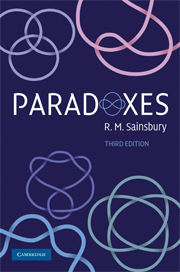Book contents
- Frontmatter
- Contents
- Foreword to third edition
- Introduction
- 1 Zeno's paradoxes: space, time, and motion
- 2 Moral paradoxes
- 3 Vagueness: the paradox of the heap
- 4 Acting rationally
- 5 Believing rationally
- 6 Classes and truth
- 7 Are any contradictions acceptable?
- Appendix I Some more paradoxes
- Appendix II Remarks on some text questions and appended paradoxes
- Bibliography
- Index
Foreword to third edition
Published online by Cambridge University Press: 05 June 2012
- Frontmatter
- Contents
- Foreword to third edition
- Introduction
- 1 Zeno's paradoxes: space, time, and motion
- 2 Moral paradoxes
- 3 Vagueness: the paradox of the heap
- 4 Acting rationally
- 5 Believing rationally
- 6 Classes and truth
- 7 Are any contradictions acceptable?
- Appendix I Some more paradoxes
- Appendix II Remarks on some text questions and appended paradoxes
- Bibliography
- Index
Summary
The main change in this edition is the addition of a new chapter on moral paradoxes, which I was inspired to write by reading Smilansky's excellent book Ten Moral Paradoxes. To Saul Smilansky I owe thanks for encouragement and comments. The new chapter is numbered 2 and subsequent chapters are renumbered accordingly. I placed the new chapter early in the book in the belief that the discussion is more straightforward than just about any of the other chapters.
I have made some small changes elsewhere, notably to the chapter on vagueness (now chapter 3) and to the suggested reading. Since the second edition appeared in 1995, the internet has transformed many aspects of our life. There are now many websites which help people doing philosophy at every level. The Stanford Encyclopedia of Philosophy (plato.stanford.edu) should be the first place to turn if your curiosity has been aroused by this text. Someone with internet access can now do serious research in philosophy, even without the advantage of a university library.
My thanks to Daniel Hill for many useful suggestions for this edition.
- Type
- Chapter
- Information
- Paradoxes , pp. vii - viiiPublisher: Cambridge University PressPrint publication year: 2009



